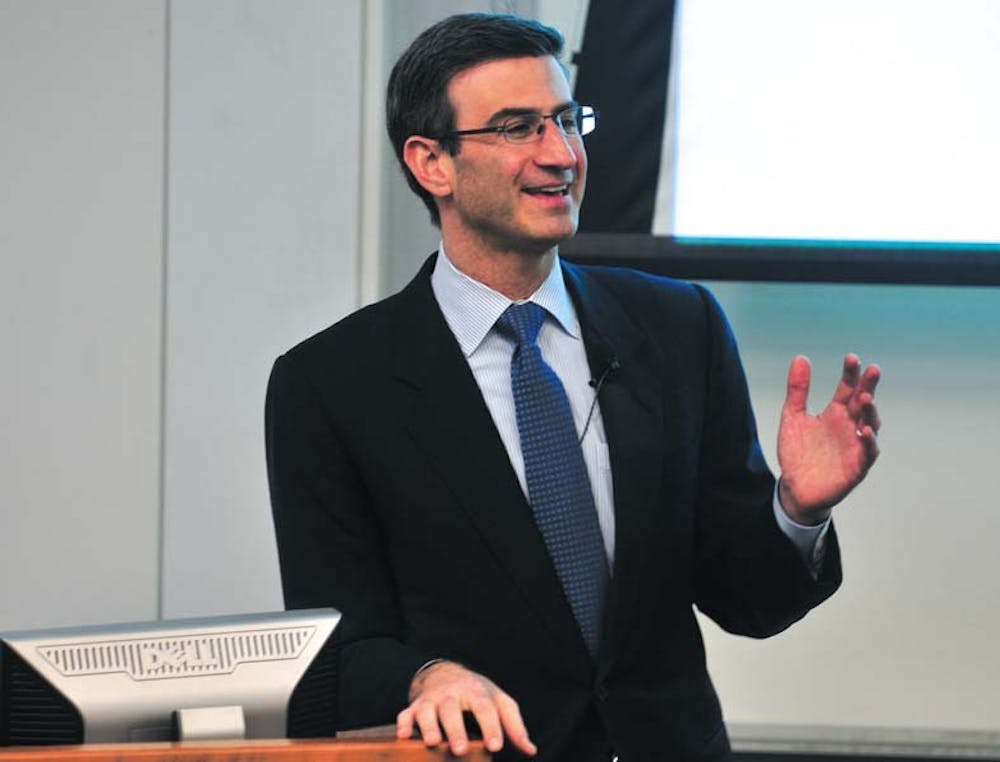
From combating national debt to financing health care reform, economic policy is Peter Orszag’s forte.
Orszag — current Citigroup vice chairman of corporate and investment banking — served as President Barack Obama’s director of the Office of Management and Budget until 2010. He spoke Thursday night at the Annenberg School of Communication at an event titled “Possibilities and Perils: The Future of Economic Policy.”
The talk, which was sponsored by the Social Science and Policy Forum, focused on how the federal government can help rebuild the American economy in the wake of the recent financial crisis.
As a former senior economist in the Clinton administration — as well as director of the Congressional Budget Office under President George W. Bush — Orszag is no stranger to tough economic issues.
It was his experience with the 2008 financial crisis, though, that brought him to campus.
Orszag began his presentation by delineating two consequences of the crisis — prolonged weakness in the labor market and a rapid run-up of sovereign debt. His suggested fix, dubbed the “barbell approach,” recommends a substantial amount of up-front stimulus spending coupled with an immediate delayed deficit reduction.
“Stimulus is warranted, and it’s beneficial, but it’s not free,” he said. “The people who are in favor of naked stimulus without deficit reduction are effectively making the labor market worse.”
Much of Orzsag’s presentation revolved around rising health care expenditures that strain the economy. However, Orszag pointed out that there seems to be a structural slowdown in health care spending, which could signal a future economic recovery.
In addition, Orszag warned of the dangers of federal austerity as it hampers economic recovery. According to one of his slides, the current sequester creates a 1.75 percent GDP reduction, which is equivalent to the estimated 1.75 percent GDP growth that the United States is projected to experience. “We’re doing this to ourselves,” he said.
College freshman Robert Klein found Orszag’s apolitical focus on technical data very pragmatic. “It’s nice to hear it from a policy perspective,” he said.
Wharton sophomore Moses Mutoko also enjoyed Orszag’s quantitative approach. “His recommendations for gradual austerity were interesting,” he said. “His macroeconomic approach is useful.”
At the end of his presentation, Orszag pointed to current political polarization as a divisive force that greatly diminishes the chance of achieving constructive policy reform.
“If you put like-minded people in a group, the group will become more extreme than any individual within the group,” he said. “The normal human tendency to seek out people who share your views is much easier now than it was 30 years ago.”
In response to an audience member’s question about the “revolving door” between the public and private sectors, Orszag explained that although alternating between the two can be destructive and unethical, it has helped him gain perspective, especially given the current political climate.
“As an economic policymaker, it’s much harder to get things done because everything is so polarizing,” he said. “I think I’ve learned more about how the U.S. economy works in two years of working with companies than my seven years at the Brookings Institute.”
The Daily Pennsylvanian is an independent, student-run newspaper. Please consider making a donation to support the coverage that shapes the University. Your generosity ensures a future of strong journalism at Penn.
DonatePlease note All comments are eligible for publication in The Daily Pennsylvanian.





